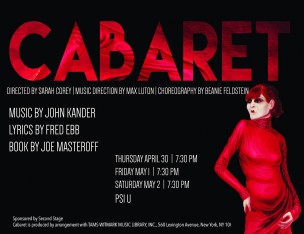
Theater is not an easy thing to do. It requires so many moving parts, so much organization, time, skill, preparation, and talent. This is especially the case for musicals, in which all the effort required to put on a show is compounded by all the effort required to make music. I have been involved in many musicals and they’re all exhausting, but there are few as difficult as the John Kander, Fred Ebb, and Joe Masteroff creation “Cabaret.”
“Cabaret,” first performed in 1966, is a show about lonely, desperate people converging in Berlin at the Kit Kat Klub, a less-than-respectable nightclub in the city. A writer falls in love with a show girl, an elderly landlady and a fruit vendor find happiness in each other, but the city around them falls to the Nazi party as they tear apart themselves and each other. The show uses its nightclub location as a device to comment on itself as a performance, and as a natural way to amplify emotion through song-and-dance. It’s a difficult show to pull off, but last weekend, the creative team of director Sarah Corey ’15, choreographer Beanie Feldstein ’15, and music director Max Luton ’17 attempted it nonetheless.
There were a lot of elements of the production that the show was fortunate to have, including a large cast featuring actors and musicians of immense talent. Visiting international student Youri Rebeko anchored the show with his gaunt, strange, engrossing portrayal of the Emcee. Rebeko, the show’s de facto lead, strutted around the stage with poise, skill, and commitment to one of the most iconic parts in the history of musical theater. The show’s central couple, uninspired author Cliff Bradshaw (Paul McCallion ’15), and alluring-yet-distant showgirl Sally Bowles (Tess Jonas ’15) turned in two very strong performances, as did Ben Zucker ’15 as Herr Schultz, a Jewish fruit vendor, and Sarah Wax ’18 as Fräulein Schneider, an old landlady and the recipient of Schultz’s affections. Each of the show’s most prominent roles was well formed thanks to Corey’s direction and the talent of the performers. There’s a searing anger and desperate fear underneath the skin of these characters that, when occasionally revealed, made for a dynamic performance.
As the songs in “Cabaret” are iconic, their execution was paramount to the quality of the show as well. Fortunately, due to Luton’s musical direction, “Cabaret” sounded excellent. The band and the performers moved confidently through classic musical numbers like “Willkommen,” “Don’t Tell Mama,” “Maybe This Time,” and “Two Ladies,” and each song was effective and comprehensible, and pushed forward by strong choreography. It certainly helps that Jonas and Rebeko, who get the lion’s share of the music, have powerful, expressive voices. The former’s rendition of the show’s title track, completely alone on stage, and the latter’s performance of “If You Could See Her,” as sung to an actor in a gorilla suit, are both powerful, interesting moments. And “Two Ladies,” always a comic highlight of the show, keeps all of its humor intact.
While these elements of “Cabaret” were very strong, some elements of the show did weaken it. One of the most compelling elements of “Cabaret” is the constant interjection of the Kit Kat Klub into the world outside of it. When Cliff decides to do some smuggling to earn money, the show immediately follows with a Kit Kat Klub performance of the hypnotic “Money.” When it becomes clear that Herr Schultz will become a target of the violence of Nazism, the Emcee sings “If You Could See Her.” The Klub exists as a place in which the show can comment on itself in comedic, tragic, and always engaging ways. However, in this production, while the commentary is still there, the world of the Klub and the world outside it feel markedly disparate. There are transitions, the changing of light, the moving of furniture, that prevent the two elements of the show from bleeding into each other. The Emcee, usually a constant presence, commenting on the action when he shouldn’t be there, is absent from most “acting” scenes. He feels shackled to the Klub, which makes it a less magical place. In this act of separation, some of the show’s energy feels undercut. When the Emcee does interact with the world outside of the club, it is a totally different performance, silent and stoic in a way that it can only be perceived if you look close enough. It’s an interesting choice, and it feels deliberate, but it’s a change that slows down the proceedings. Each scene feels like it’s in its own world, and that limits the ability to draw on the energy of the scenes around it.
Putting on this production in Psi U amplified the play’s transparency. Members of the cast and ensemble walked through the rows of audience members, and could be seen on every side of the stage. That being said, the stage itself was difficult to see from most of the seats. Everything that happened below the shoulders of many actors was woefully imperceptible. The fact that the performance was understandable even with these limitations is a testament to the talent of the people involved, but the lack of visibility did not work in the show’s favor.
There is a lot to like about this production of “Cabaret.” It boasted some very strong performances, both in song and in scene, and had moments of great power, humor, and devastation. However, it could have used more self-commentary, a better space, and a more cohesive integration of the world. Even so, it was a huge, complex musical that required dedication and talent to make. That’s something worth celebrating and singing about.


Leave a Reply